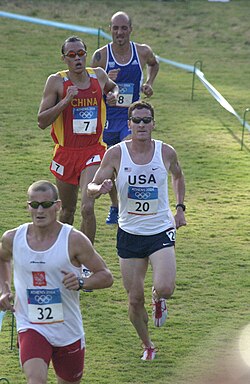Modern pentathlon: Difference between revisions
Contested means disputed |
No edit summary |
||
| Line 224: | Line 224: | ||
*[http://www.modern-pentathlon.com A guide to Modern Pentathlon] |
*[http://www.modern-pentathlon.com A guide to Modern Pentathlon] |
||
*[http://www.pentathlon.org.au Modern Pentathlon Australia] |
*[http://www.pentathlon.org.au Modern Pentathlon Australia] |
||
*[http://modern-pentathlon.sportubes.com Modern Pentathlon |
*[http://modern-pentathlon.sportubes.com Modern Pentathlon Internet community] |
||
*[http://www.pentathlon-perpignan.fr/index.php?easiestml_lang=en Modern Pentathlon in Perpignan, France] |
|||
[[Category:Fencing]] |
[[Category:Fencing]] |
||
Revision as of 06:16, 26 August 2008

The modern pentathlon is a sports contest that includes five events, derived from the Greek root of pente, meaning five. The events are epee fencing, pistol shooting, 200 m freestyle swimming, a show jumping course on horseback, and a 3 km cross-country run. The epithet modern is important to discern it from the ancient athletics pentathlon – none of the events of modern pentathlon were part of the ancient Olympics.
The modern pentathlon was invented by the Baron Pierre de Coubertin, the founder of the modern Olympic Games. As the events of the ancient pentathlon were modeled after the skills of the ideal soldier of that time, Coubertin created the contest to simulate the experience of a 19th century cavalry soldier behind enemy lines: he must ride an unfamiliar horse, fight with pistol and sword, swim, and run.
The event was first held at the 1912 Olympic Games, and was won by Swedish athlete Gösta Lilliehöök.
The modern pentathlon has been on the Olympic program continuously since 1912. A team event was added to the Olympic Games in 1952 and discontinued in 1992. An event for women was added in 2000. In non-Olympic years, a World Championship is held, beginning in 1949. Originally the competition took place over four or five days; however in 1996 a one-day format was adopted in an effort to improve the event's commercial image. In spite of the event's strong pedigree in the modern olympics, and its status as the only event created specifically for the modern Olympic Games, its lack of widespread popularity outside of Eastern Europe has led to calls for its removal from the Olympic Games in recent years.
However, a vote by the IOC on July 8, 2005, keeps it in the Olympic program at least until 2012.
The sport is governed by the Union Internationale de Pentathlon Moderne (UIPM), the International Modern Pentathlon Union.
Disciplines of the modern pentathlon
Shooting
The shooting discipline involves using a 4.5 mm air pistol in the standing position from 10 metres distance at a stationary target. Each competitor has 20 shots, with 40 seconds for each shot.
Fencing
The fencing discipline uses the épée. The competition is a round-robin, meaning each competitor will face all the other competitors once. Each match lasts up to one minute; the first fencer to score a hit wins instantly. If neither scores within one minute, both lose the match.
Swimming
The swimming discipline is a 200 m freestyle race. Competitors are seeded in heats according to their fastest time over the distance.
Riding
The riding discipline involves show jumping over a 350-450 meter course with 12 to 15 obstacles. Competitors are paired with horses in a draw 20 minutes before the start of the event.
Running
The running discipline involves a 3 km cross-country race. Competitors are ranked according to their score from the first four disciplines and given different start times, with the leader going first. The first person to cross the finish line is the overall winner of the pentathlon.
World champions
Individual men
Individual women
| Year | Athlete | Nationality |
|---|---|---|
| 1981 | A Ahlgren | |
| 1982 | W Norman | |
| 1983 | L Chernobrywy | |
| 1984 | S Jakovleva | |
| 1985 | B Kotowska | |
| 1986 | I Kisselyeva | |
| 1987 | I Kisselyeva | |
| 1988 | D Idzi | |
| 1989 | Lori Norwood | |
| 1990 | Eva Fjellerup | |
| 1991 | Eva Fjellerup | |
| 1992 | Iwona Kowalewska | |
| 1993 | Eva Fjellerup | |
| 1994 | Eva Fjellerup | |
| 1995 | K Danielsson | |
| 1996 | Janna Dolgaschewa-Schubenok | |
| 1997 | J Suworowa | |
| 1998 | Anna Sulima | |
| 1999 | Zsuzsanna Vörös | |
| 2000 | P Svarre | |
| 2001 | Stephanie Cook | |
| 2002 | Bea Simoka | |
| 2003 | Zsuzsanna Vörös | |
| 2004 | Zsuzsanna Vörös | |
| 2005 | Claudia Corsini | |
| 2006 | Marta Dziadura | |
| 2007 | Amélie Cazé | |
| 2008 | Amélie Cazé |
See also
Other multiple event contests
- Biathlon
- Duathlon
- Triathlon
- Quadrathlon
- Pentathlon
- Heptathlon
- Octathlon (primarily a youth or junior event although logistical problems have seen senior octathlons contested, for example at the 2007 South Pacific Games)
- Decathlon
- Chess boxing
